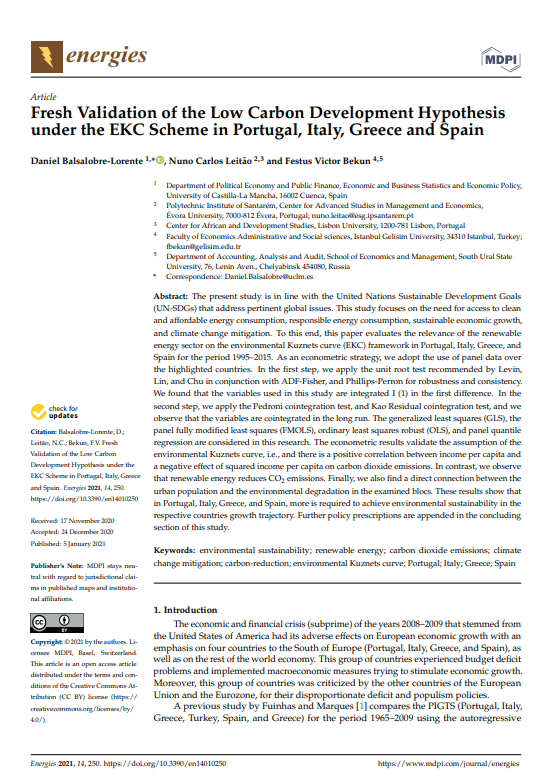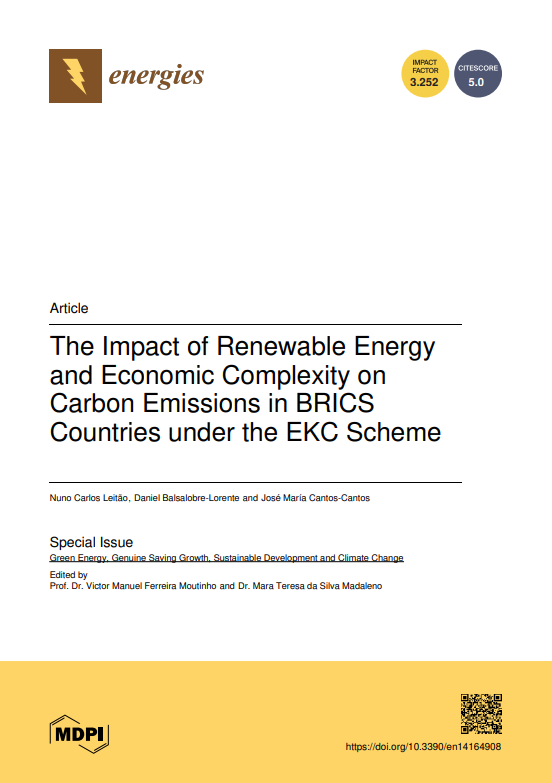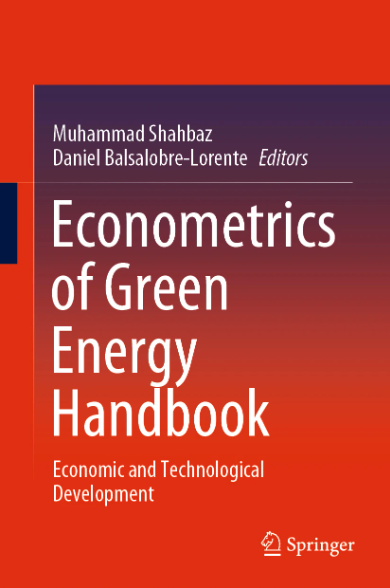Climate and Environment

Fresh Validation of the Low Carbon Development Hypothesis under the EKC Scheme in Portugal, Italy, Greece and Spain
Abstract:
Fresh Validation of the Low Carbon Development Hypothesis under the EKC Scheme in Portugal, Italy, Greece and Spain is in line with the United Nations Sustainable Development Goals (UN-SDGs) that address pertinent global issues. This study focuses on the need for access to clean and affordable energy consumption, responsible energy consumption, sustainable economic growth, and climate change mitigation. To this end, this paper evaluates the relevance of the renewable energy sector on the environmental Kuznets curve (EKC) framework in Portugal, Italy, Greece, and Spain for the period 1995–2015. As an econometric strategy, we adopt the use of panel data over the highlighted countries. In the first step, we apply the unit root test recommended by Levin, Lin, and Chu in conjunction with ADF-Fisher, and Phillips-Perron for robustness and consistency. We found that the variables used in this study are integrated I (1) in the first difference. In the second step, we apply the Pedroni cointegration test, and Kao Residual cointegration test, and we observe that the variables are cointegrated in the long run. The generalized least squares (GLS), the panel fully modified least squares (FMOLS), ordinary least squares robust (OLS), and panel quantile regression are considered in this research. The econometric results validate the assumption of the environmental Kuznets curve, i.e., and there is a positive correlation between income per capita and a negative effect of squared income per capita on carbon dioxide emissions. In contrast, we observe that renewable energy reduces CO2 emissions. Finally, we also find a direct connection between the urban population and the environmental degradation in the examined blocs. These results show that in Portugal, Italy, Greece, and Spain, more is required to achieve environmental sustainability in the respective countries growth trajectory. Further policy prescriptions are appended in the concluding section of this study.
Quotation:
Balsalobre-Lorente, D., Leitão, N.C., Bekun, F., V. (2021). Fresh Validation of the Low Carbon Development Hypothesis under EKC Scheme in Portugal, Italy, Greece, and Spain. Energies 2021. 14(1), 250. https://doi.org/10.3390/en14010250

The Impact of Renewable Energy and Economic Complexity on Carbon Emissions in BRICS Countries under the EKC Scheme
Abstract:
Economic complexity makes it possible to assess the development of the countries, the relations of innovation, and the differentiation of products. The Impact of Renewable Energy and Economic Complexity on Carbon Emissions in BRICS Countries under the EKC Scheme considers the links between the hypotheses of the Kuznets environmental curve and economic complexity using panel data for the group of BRICS countries (Brazil, Russia, India, China, and South Africa) from 1990 to 2015. As an econometric strategy, this study considered the panel fully modified least squares (FMOLS), panel dynamic least squares (DOLS), fixed effects (FE), and Panel Quantile Regression. The empirical results showed that economic complexity, income per capita, renewable energy, and carbon dioxide emissions are integrated with the first difference when applying the unit root test. The arguments of Pedroni and Kao cointegration tests were also used. According to these results, the variables used in this research are cointegrated in the long run. The results validated the arguments of the EKC hypothesis, i.e., the income per capita and squared income per capita are positively and negatively correlated with CO2 emissions. Moreover, economic complexity and renewable energy aim to improve environmental damage and climate change.
Quotation:
Leitão, N.C., Balsalobre-Lorente, D., Cantos-Cantos, J.M. The Impact of Renewable Energy and Economic Complexity on Carbon Emissions in BRICS Countries under the EKC Scheme. Energies 2021, 14, 4908. https://doi.org/10.3390/en14164908

The Causality between Energy Consumption, Urban Population, Carbon Dioxide Emissions and Economic Growth.
Abstract:
This article assesses the relationship between electricity consumption and urbanisation by comparing the econometric results of distributed autoregressive lag (ARDL) and vector autoregressive lag (VAR) for the period 1960-2015. Granger causality is also applied to the Portuguese economy. In this study, we use some hypotheses that describe the link between electricity consumption, urban population, carbon dioxide emissions, and economic growth. The motivation of this research focuses on the relationship between electricity consumption (energy consumption) and urban population, supported by the theoretical and empirical contributions of energy and urban economics. The empirical results show that electricity consumption exhibits causality with economic growth, urban population, carbon dioxide emissions, and international trade. This research also proves that there is cointegration among all variables in the long run. Authored by Nuno Carlos Leitão e Daniel Balslobre-Lorente, this chapter (nº5) is part of the book “Econometrics of Green Energy Handbook”, which shares essential insights into the dynamic between energy innovations, environmental guidelines, and economic development, demonstrates how globalization has led to the development of greener energy technologies, paints a global picture using case studies on energy innovation in numerous countries and discusses both technological and policy aspects of green energy development.
Quotation:
Leitão, N.C. & Lorente, D. B. (2020): The Causality between Energy Consumption, Urban Population, Carbon Dioxide Emissions and Economic Growth. Springer Handbook Green Energy Series: Econometry of Green Energy- Economy and Technological and Development. Publisher: Springer.





